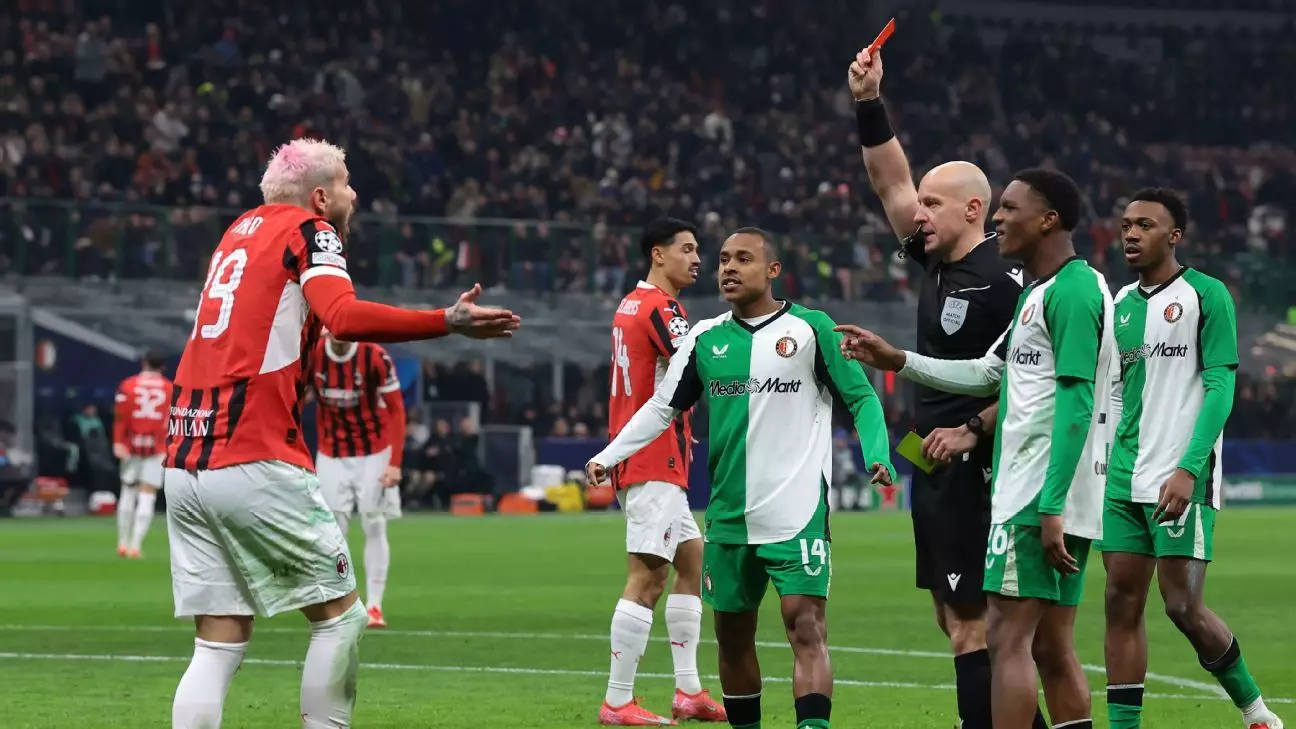In the world of football, pivotal moments can shift the outcome of games and the fortunes of clubs. This was starkly illustrated during AC Milan’s disappointing Champions League playoff against Feyenoord when a single reckless decision from Theo Hernández sealed the fate of the Rossoneri. Just five minutes into the second half, a moment of ill-advised bravado changed the trajectory of the match, and with it, Milan’s ambitions in Europe were dashed. This stunning oversight marked a turning point that would leave lasting repercussions for both the player and the club.
Milan began the match with purpose, hungry for a victory that would allow them to eradicate the embarrassment of a one-goal deficit from the first leg. The team quickly found their rhythm, registering an early goal courtesy of the new signing Santi Gimenez. In theory, victory was firmly within their grasp. They held the upper hand, sensing that Feyenoord, weakened and youth-laden, were ripe for the taking. The stage was set for a comfortable home win, and the fans at the San Siro had reason to feel optimistic.
However, the tides turned dramatically when Hernández’s bewildering decision not only resulted in his exclusion from the match but injected doubt into a team that had looked so confident in the first half. The full-back, celebrated for his attacking prowess and agility, succumbed to poor judgment when he attempted to deceive the referee in search of a penalty. His actions, devoid of any justification, cost him a red card following a second yellow. The referee, Szymon Marciniak, had little option but to enforce the rules as they stood.
Worse yet, Hernández’s first yellow card, acquired at the close of the first half for a needless foul, had already set a precarious precedent. The prevailing narrative suggests that risk management is part of a player’s decision-making arsenal, and on this occasion, the La Liga defender miscalculated the risk associated with his actions. As Milan had positioned themselves to pursue a second goal, Hernández’s choices took them down a treacherous path—a path where any hope of securing a further advantage evaporated with his exit.
In the aftermath of the chaos that followed Hernández’s dismissal, Milan’s leadership faced the scrutiny that inevitably follows post-match analysis. Coach Sérgio Conceição, while shouldering the blame in part, was forced to make reactive choices that ultimately seemed to compound the crisis rather than resolve it. Many questioned his substitutions, particularly pulling off key players like Pulisic and Gimenez while leaving two fragile forwards on the pitch, thus allowing Feyenoord an unexpected advantage.
The emotional weight of the defeat reverberated throughout the club, with figures like Zlatan Ibrahimovic expressing palpable frustration. The iconic forward’s statements reflected a discontent with the performance, underscored by the sentiment of collective responsibility rather than singling out Hernández. Yet, the stark reality remains: a major error had taken place that day, and the team was left to reckon with the ramifications.
As Feyenoord seized momentum, they managed to equalize; Julián Carranza’s well-crafted header swung the balance in their favor, complicating matters further for Milan. With a man down, the players were left to navigate a rapidly dwindling hope for a comeback. The inability to recalibrate under pressure led to further displays of disarray, exemplified by lingering frustration and unnecessary yellow cards that habitually punctuated the match.
This match transcended mere statistics and scores; it became an object lesson on the razor-thin line separating victory from defeat. Football is a game where decisions are magnified through the lens of consequence, and Milan learned this the hard way. Footballing misadventures like these serve as a reminder of the importance of discipline, especially in high-stake situations involving elite clubs.
The aftermath, steeped in despair and disappointment, likely led to harsh conversations within the Milan camp—a team that had expected to advance but instead faced a reckoning. For Hernández, the incident will remain etched in memory, a painful reminder of how individual choices wield tremendous power in the context of collective goals. Reconciling with the pain of this defeat is not merely a burden for Hernández but a shared lesson for a team keen to return to its glory days.
As they look ahead, the Rossoneri will not only strive to hone their skills on the pitch but also learn to weather the emotional storms that can arise from pivotal decisions. Football is as much about mental fortitude as it is about physical prowess, and it is this synthesis that will determine Milan’s future performance both domestically and in Europe. Only time will tell if they can rise from the ashes of this defeat to reclaim their place among the continent’s elite.

Leave a Reply